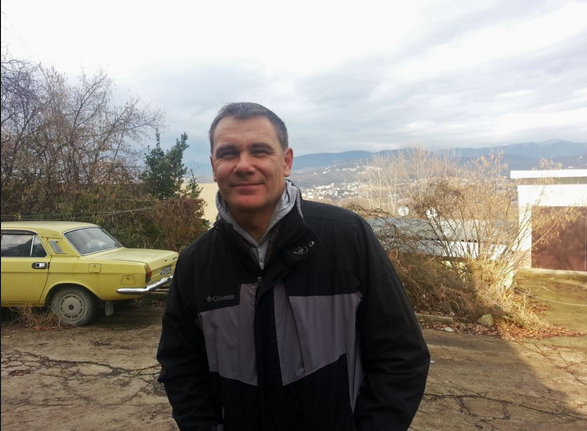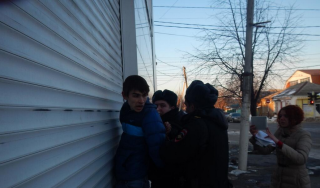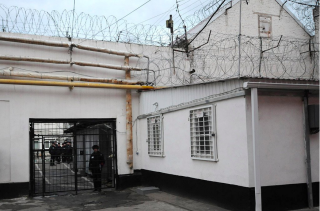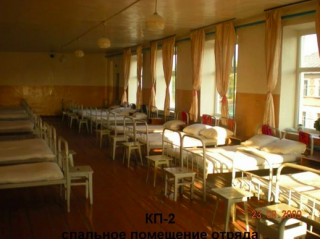
From Ukraine peace plans to Kazakh uranium—all that and more in our new nuclear digest
Our November Nuclear Digest by Bellona’s Environmental Transparency Center is out now. Here’s a quick taste of just three nuclear issues arising in U...
News

Publish date: September 18, 2014
News
A week of Russia-wide protests in support of Yevgeny Vitishko, who is serving a three-year prison sentence for his outspoken ecological criticism of the 2014 Sochi Winter Olympic Games, may end in an appeal that would lead to his release.
Vitishko was declared a Prisoner of Conscience by Amnesty International immediately upon his imprisonment during the Sochi Olympics.
A prosecutors’ inquiry into the circumstances of Vitishko’s imprisonment have led to a September 24 appeal date in the Krasnodar Regional Court, which originally sentenced the environmentalist to a settlement colony in Russia’s Tambov Region, 1000 kilometers north of the Black Sea coastal town of Sochi.
The Sochi Olympic push, which was Soviet in its dimensions, was presented by the Kremlin as an international showcase of Vladimir Putin’s “modern Russia.”
It led to dozens human rights abuses during the February Games and hundreds of instances of irreversible environmental devastation, as documented by Vitishko and his colleagues at the Environmental Watch on the North Caucasus (EWNC) in a damning report they produced. The Kremlin anti-extremism unites tried to scare them off publishing it for fear it would “create a negative image of Russia.”
When it was clear that scare tactic had failed, police responded by harassing, following, spying on and arresting nearly everyone who worked for or came into contact with the group.

While he has been in prison, Vitishko has taken up the case of exposing mass beatings and harassment visited on convicts by guards, as well as guards’ attempts to blackmail convicts into ganging up on other convicts who pose inconveniences for the penitentiary staff.
Vitishko’s colleagues at EWNC maintained cautious optimism about Vitishko’s possible freedom.
“There is a chance that as a result of a review by the court of the prosecutor’s inquiry that Yevgeny [Vitishko] could walk free,” they told Bellona in a statement. “However, the Krasnodar Regional authorities, who unfortunately hold a great deal of influence over the regional court, are doing everything possible to scuttle this.”
“If a decision from the Krasnodar Regional Court does not free Vitishko now by virtue of the prosecutors inquiry,” EWNC continued, “then we hardly see any possibility of securing his freedom via other legal mechanisms.”
Vitishko was originally sentenced in February to three years imprisonment while attempting to appeal a two-year suspended sentence handed down to him and his EWNC colleague Suren Gazaryan for allegedly spray painting a construction fence surrounding the summer home that Krasnodar regional governor and Olympic booster, Alexander Tkachev was building on public lands.

Vitishko, Gazaryan and a host of witnesses deny either man had anything to do with the spray painting.
Now, according to a letter from one VG Kruglov, a deputy prosecutor for the Krasnodar Region, which is posted on EWNC’s website in Russian, prosecutors admit the appellate case that ended in Vitishko’s jailing was marred by procedural violations.
The letter was posted by Kruglov on July 17 to the Presidium of the Krasnodar Regional court and identified a host of inconsistencies in testimony presented against Vitishko.
Among them were witness reports indicating that Vitishko repeatedly skipped monthly meetings with his probation officer, which was a condition of the two-year sentence he was already serving. The notion that Vitishko intentionally paid no mind to his probation office visits was central to the judge’s ruling to imprison him.
Kruglov, however, noted that each of the skipped meetings but two were rescheduled by Vitishko himself, and that he had freely admitted to missing the two meetings during the court proceedings at which he was only present via a scratchy closed circuit television feed from a jailhouse in his hometown of Tuapse, where he was serving a trumped up 15-day administrative sentence for using foul language in public.
After the administrative sentence was completed, wrote Kruglov – as was also protested by many Russia legal experts and Vitishko’s supporters at the time – Vitishko was legally to have been released from the Tuapse jail to pick up his personal effects at home, visit with his sons, and then surrender himself on his own recognizance to the Russian Penal Service for transportation to his prison colony.
But that never happened.

Instead, Vitishko – reportedly on secret orders of the Krasnodar judge, issued in cahoots with Krasnodar prosecutor – was spirited away from Tuapse under armed guard and bounced to the Krasnodar central remand prison’s section for especially dangerous criminals. From there, he again vanished from sight for several days, before he finally turned up at the Tambov Regions KP-2, or Sadovaya, settlement colony.
Kruglov’s letter also noted that the evidence of Vitishko skipping his probation meetings was shabby, based as it was on anonymous testimony from his neighbors in Tuapse.
On Thursday, Vitishko’s lawyer Alexander Popkov, received a letter from the Presidium of the Krasnodar Regional Court (in Russian) saying that the appeal of Vitishko’s sentence would be heard on September 24.
The deputy chairman of the Krasnodar court, identified in the letter as S.E. Krotov, wrote Popkov, saying, “I ask you whether there is information in the personal affects of the convicted that the sentence was carried out in compliance with the new criminal law, in order that its position be studied.”
In an email interview with Bellona Thursday, Popkov was somewhat confused by the rapidly unfolding events.
“We have a rather confusing situation – the prosecutors issued a protest how Yevgeny [Vitishko] was send to the prison colony,” wrote Popkov. “ The court has set a hearing to review the issue of Yevgeny being sent to the prison colony in an armed convoy rather than on is own recognizance.”
Nils Bøhmer, Bellona’s managing director, said: “It is very good news that it seems like Vithisko will now get a good chance to be cleared of the ridiculous charges he was sentenced for. At the same time, ” continued Bøhmer, “it also shows the bag of dirty tricks that Putin used to stop the main critical voice of the Sochi Olympics.”

Popkov confirmed the date of the hearing and said, “We hope that [the court] will review the issue of freeing him.”
The motives of the Krasnodar Prosecutor’s office seem unclear. After zealously shuttling Vitishko out of public view with the trumped up public swearing charges and then sweeping him into obscurity for several days while he was transported to the prison colony, Krasnodar Governor Tkachev seemed to be extracting his pound of flesh for Vitishko’s Olympic protests – and for the graffiti spray painted on the construction fence around his palatial vacation digs that were built in the middle of a nature reserve.
The sudden seeming apologia from prosecutors, and perhaps the court, over Vitishko’s forced transport directly to the prison colony and the procedural errors that riddled the case is a bolt from the blue.
Prosecutors in the Krasnodar Region could not immediately be reached for comment on their seeming change of heart.
Activists both Russia-wide and internationally continue to call for Vitishko’s immediate, unconditional release as EWNC’s “Week in Defense of Yevgeny Vitishko” kicked off yesterday, and is timed, the organization told Bellona, to run up until Vitishko’s appeal date.
The protests in support of Vitishko will take the form of public demonstrations in Russia and abroad, and will be supported by international rights groups, like Amnesty International and Human Rights Watch.

Our November Nuclear Digest by Bellona’s Environmental Transparency Center is out now. Here’s a quick taste of just three nuclear issues arising in U...

For three years now, Bellona has continued its work in exile from Vilnius, sustaining and expanding its analysis despite war, repression, and the collapse of international cooperation with Russia in the environmental and nuclear fields

The Board of the Bellona Foundation has appointed former Minister of Climate and the Environment Sveinung Rotevatn as Managing Director of Bellona No...

Økokrim, Norway’s authority for investigating and prosecuting economic and environmental crime, has imposed a record fine on Equinor following a comp...